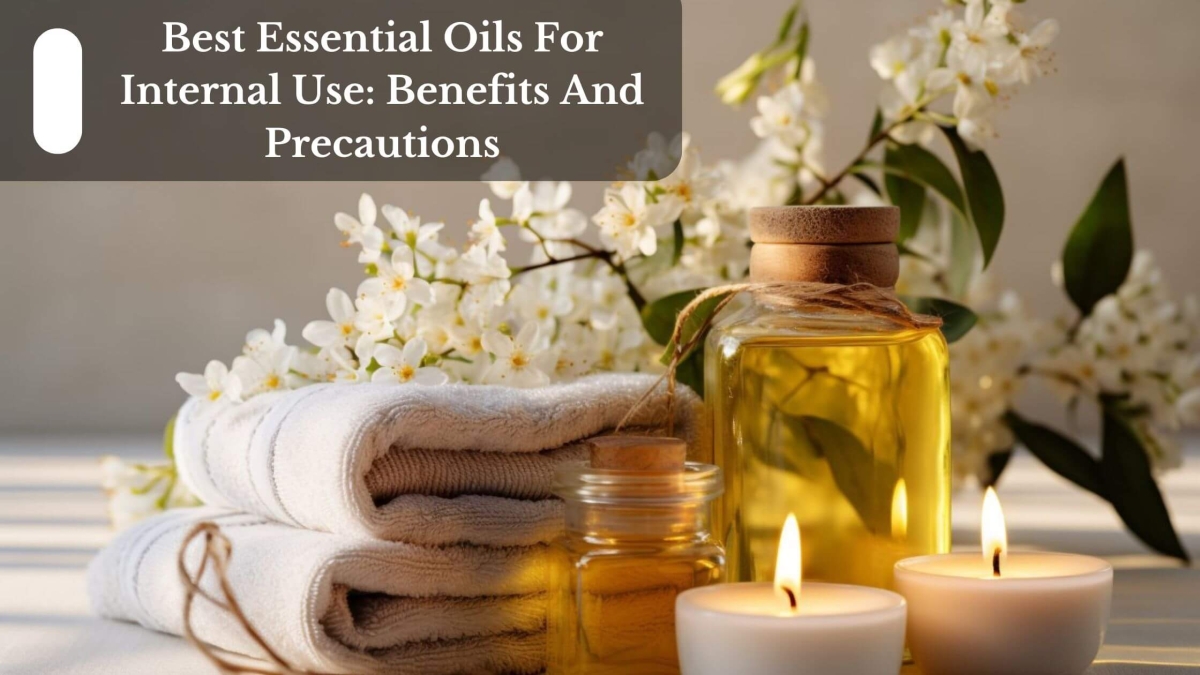Essential oils are used in several ways to nurture your body inside out. From enhancing your mental health to clearing up your physical health issues and more they have been throughout your journey. But when it comes to the internal use of essential oils many people are deliberate about the fact. And why not essential oils are way too concentrated to be ingested at any cost? But then why is there a misconception that essential oils can be ingested in some ways or with proper precautions? Well, today we will burst all the related essential oils for internal use. Even though this topic holds a lot of debate here is a perspective that might assist you in making the right decision.
What Are Essential Oils?
Essential oils are the essence of plants extracted from the roots, stems, leaves, flowers, and bark of the plant. They retain the most potent liquid in them and are often used for their therapeutic qualities. Additionally, these essential oils possess antibacterial, antifungal, anti-inflammatory, and antimicrobial properties that solve various healthcare concerns.
Further, essential oils offer immense skincare, and haircare benefits that are truly impeccable. But, when we talk specifically about the ingestion of essential oils there are many claims. Aromatherapy experts primarily do not recommend essential oils for internal use as they might prove to be poisonous. Also, these essential oils are powerful so they can lead to inflammation in your gut or even trigger some other healthcare problems.
On the same page, some experts also disclose that many people add essential oils to their recipes and even use them for oral hygiene. So, exactly what is the truth? You know many people might be contemplating this question. So, here is a clear opinion about the same.
What Does The Internal Use Of Essential Oils Mean?
The internal use of essential oils means taking a certain amount of drinks or several food items. To be on the safer side, essential oils are not supposed to be ingested directly. However, various components of essential oils, or the ones derived from them are used in many flavored beverages and food items. The internal use of essential oils requires specialized knowledge and expertise in the field so that it does not lead to toxicity in the body.
Why Consider Essential Oils For Internal Use?
Many people wonder about taking organic essential oils for internal use. Several reasons usually tempt them and are ascertained to be quite effective. Essential oils for internal use usually help to minimize the chances of gut inflammation and tackle digestive issues along with problems including IBS. For these reasons, many people take essential oils for internal use.
You may also like:
Many essential oils including peppermint, lemon, chamomile, and lavender essential oil are known to have potent therapeutic qualities for internal use. They also possess antioxidant properties which are mainly utilized by consumers while ingesting essential oils.
In some cases, people also use essential oils for internal use to add a punch of flavor and fragrance to their food. A group of people also feel that ingesting Essential oil is related to extracting the most potent benefits of the plants directly into your body. However, this might not be a safe case.
Benefits Of Internal Use Of Essential Oils
As per The Food And Drug Administration, certain essential oils are considered safe to ingest. These essential oils are rich in anti-inflammatory, antibacterial, and various other properties that benefit your body in the long run. However, one should always consult a professional before taking essential oils for internal use. Here are some of the benefits that only a few essential oils for internal use might provide.
- Some essential oils are rich in antioxidant properties, which makes them a powerful one to consume. These essential oils include lemon or peppermint oil. Antioxidant essential oils that are safe for internal use also restrict the damage of cells triggered by free radicals.
- Some essential oils that are safe for internal use help to improve mood and promote relaxation.
- A few essential oils meant for internal use help to reduce migraine issues and improve cognitive abilities. If you are suffering from a headache and want instant relaxation therapy, then essential oils are the one for you.
Are Essential Oils Safe For Internal Use?
While talking about the safety of ingesting essential oils, here is a clear-cut statement by the experts. Essential oils are never meant for internal consumption and they might prove to be a toxic element for your body. As you know essential oils are derived directly from nature, and they hold quite rich and therapeutic properties, this is the reason why many people think that essential oils are not harmful for internal use.
However, the truth is that specialists do not recommend essential oils for internal use. Essential oils can create an irritating environment inside your stomach which can harm your organs and might also affect the lining of your digestive system. Since they are extremely concentrated and highly potent they might have serious side effects on your body. When taken in small doses, they might rarely turn out to be the right decision but in 99% of cases they are not. Essential Oils when applied topically and that too with prior dilution with a carrier oil or water are proven to be effective. So ingesting them without any proper dilution might prove to be a harmful decision for your body.
Top Essential Oils For Internal Use
Even after a lot of contemplation, there might be a few or only one or two essential oils that might be safe to ingest. As per the Food and Drug Administration, certain oils are usually termed as safe. However, they are generally not regulated to be ingested. If you are still keen to understand the logic of essential oils for internal use then it is better to choose food-grade oils. So, look out for oils that are certified to be ingested without causing any severe effects on your body.
- Peppermint essential oil
- Ginger essential oil
- Cinnamon essential oil
- Lemon essential oil
Also one should always consult a physician or an expert before using essential oils for internal use. Since essential oils are very strong ingesting even a small dosage might prove to be a wrong choice.
How To Safely Use Essential Oils Internally?
If you are here looking out for the top ways to use essential oils internally, then we recommend you consult a specialist. Only a certified professional with years of experience in aroma therapy and essential oils can guide you with the internal usage of essential oils.
Essential oils are never recommended for internal use as they might lead to gut inflammation and other serious concerns. However, essential oils can be used in several other ways. These tricks are the best and offer amazing benefits.
- You can simply diffuse essential oils and explore a wide range of incredible benefits.
- Another way to use essential oils is by combining them with the choice of carrier oil. You can simply dilute them with a carrier oil and apply them topically for massage therapy.
Precautions For Internal Use
- If you are taking essential oils internally after consulting with a specialist, make sure to take the necessary precautions.
- Never ingest essential oils based on your thoughts and opinions.
- Use essential oils in a diluted form and a very minimal quantity.
- Do not go overboard while pouring essential oils as they are highly concentrated.
- Never run into the Fomo of ingesting essential oils as it might work for some but might be disastrous for other people.
- Never use low-quality cheap essential oils, which are packed with flavors and colors.
Potential Side Effects And Risks Of Essential Oils
- The major side effect of essential oils is that they trigger inflammation in the body.
- If you notice any kind of inflammation or digestive issues in the gut, you might be going through the side effects of essential oils.
- Taking essential oils internally can also lead to various skin concerns that you might not recognize initially.
- There are various risks associated with the internal use of essential oils.
- Essential oils can harm your stomach and can also create problems in the respiratory tract.
- Overall, there is no scientific evidence supporting the internal use of essential oils and their safety in the long run.
As mentioned above, one must always consult specialists before indulging in the cycle of essential oils for internal use.
When To Seek Professional Guidance?
As per our experts, we recommend seeking professional guidance right from the start. If you are making up your mind for internal use of essential oils, seek guidance from professionals and ask them how to do it ideally. Also, do not forget to keep in touch with the experts if you notice any side effects in your body.
You may also like:
Common Myths About The Internal Use Of Essential Oil

Here are some of the common myths about using essential oils internally:
1. Essential Oils Are Completely Safe Because They Are Natural
No essential oil is safe for internal use. Just because they are extracted from the plants, doesn’t mean that they can be taken internally without any proper prescription or guidance.
2. Essential Oils Cure Major Diseases
This is wrong. Essential oils are not meant to cure disease from its roots. Of course, they have healing and beneficial qualities, which are great for healing the body. However, these properties do not qualify the internal usage of essential oils.
3. High Dosages Of Essential Oils Are Effective
With regards to essential oils, the tagline of less is more is always applicable. The less you take, the more it affects your body, skin, or overall health.
Takeaway
We are finally nearing the end of the series of essential oils for internal use. So, now you know that ingesting essential oils is not a safe option. However, you can include it in your routine in some other ways. Choose the best and highest-quality essential oils available at mokshalifestyle.com









